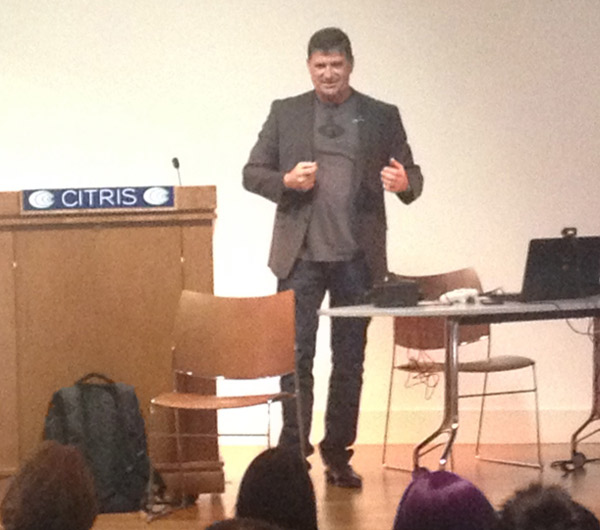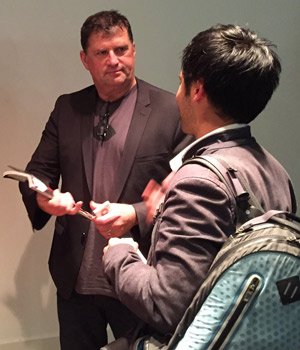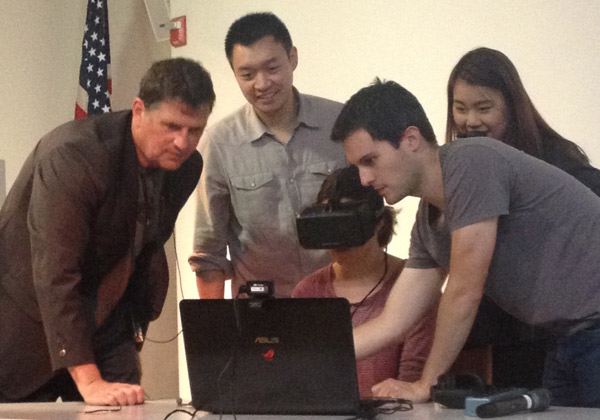Maker Hero: Alumnus Jack McCauley on Guitar Hero, Oculus and the Future of Making
The design mastermind behind Guitar Hero and the Oculus Rift spoke to a packed auditorium of students recently. Jack McCauley, EECS ’86 shared stories from his 30+ years of experience describing how a lifelong passion for tinkering yielded a varied and path-breaking career in hardware engineering and design.
|
|
As the inaugural lecture of the Berkeley Innovators Lecture Series, the event was co-sponsored by The Foundry@CITRIS and the Cal Startup Network. Designed to connect today’s students with Berkeley’s innovative founders and startups, the lecture series brings alumni from all areas of the technology and innovation sector to share their experiences, and, when possible, demo their products for current students.
A Bay Area native, McCauley has been taking things apart for as long as he can remember. “I would spend hours drawing and painting,” McCauley recalled of his childhood, “I liked to pick things up and draw them, try to study them, and then take them apart. Many of my days consisted of going to the library and reading books. Then at night, I would go home, pick up some model or something at the store, take it apart, and put it back together. That’s basically what I liked to do.” In the process, McCauley developed an understanding of how everyday items are constructed and designed.
After high school, McCauley took courses in mechanical engineering, science, and math at Diablo Valley College, then landed a job as a nuclear power engineer with the Department of Defense. “At least I think I was an engineer,” McCauley recalled, “I was pretty confident, and pretty soon I could understand more about the systems that the engineers were working on than the engineers did themselves.” Impressed by his talent, the Department of Defense awarded McCauley a full scholarship to the College of Engineering at UC Berkeley.
|
|
Still committed to tinkering, McCauley wasn’t interested in merely taking courses at Cal – he wanted opportunities to get his hands dirty. “We didn’t have what you have now with innovation and design labs right on campus,” McCauley explained. Nevertheless, he soon found his niche in a laboratory in Cory Hall, where he assisted graduate student Max Hauser and, eventually, EECS Professor Elwyn Berlekamp with their research.
“Cal kicked everything off for me,” McCauley shared. After graduation, Berlekamp hired McCauley, and together they built a digital film encoding startup called Cyclotomics. From there, McCauley applied his digital hardware expertise to the gaming industry, working on controls and control systems for numerous companies including Microsoft and Sony. In the meantime, McCauley got to know other inventors and engineers, and began writing his own patents. He reverse engineered the Wii and PS2, and eventually, earned a reputation in the video gaming world.
It was around that time that someone at Cal-founded RedOctane contacted McCauley with the idea to take a plastic guitar, write music around it, and turn the guitar into a game controller. Skeptical at first, McCauley reverse engineered a plastic guitar from the Japanese game Guitar Freaks and wrote a demo game. After witnessing the popularity of the demo product, McCauley, alongside fellow Cal alumni Charles Huang ’93 and Kai Huang ’94, began working to build the guitar and integrate it into a new game. Guitar Hero was born. “We thought we’d sell maybe 100,000,” McCauley reminisced, “instead, we did 12 million. We sold the company so we’d have the capital to produce more and, eventually, sold 50 million of those things.”
|
|
McCauley went on to develop the Guitar Hero drums and continued tinkering with anything he could get his hands on. In 2011, Oculus founder Palmer Luckey and CEO Brendan Iribe approached McCauley with Palmer’s prototype. “They walked into my studio and said this is going to change the world.” Skeptical again, McCauley cautiously joined the Oculus team and started building the first iteration of the Oculus Rift. “We had Brendan doing the business stuff and, along with Palmer and John Carmack, we started working on this thing. We launched a Kickstarter campaign and sold about 8,000. We got some additional investment funding, put the product out there, and sales were really good.” Even with good sales, McCauley and the rest of the Oculus team continued tinkering. They introduced positional tracking to the latest version of the Rift, and have continued working to improve the product – now with the help of Facebook, which acquired the company in a $2 billion deal in early 2014. As student attendees can attest, the new version is even better than the first.
When asked about his expectations for the product, McCauley explained that his excitement about the Oculus Rift has to do with more than its impact on the gaming world. In addition to changing the way we engage with virtual reality, McCauley believes that the Rift will also reveal that there is a lot we don’t know about how the brain interprets the world we have in front of us. “What this thing will reveal about human perception,” McCauley concluded, “will be its greatest contribution.”
McCauley closed his talk by inviting all attendees to try out the new Oculus Rift for themselves. “The Rift is certainly one of the most amazing things I’ve seen,” commented student Katherine Yip, “It’s not really possible to describe what the experience is verbally, but as soon as I put the goggles on, turned to the back, and moved my body to avoid crashing into Mercury (the planet), I think my jaw dropped. It’s awesome.”
Students and staff alike were inspired by Jack’s story. “We were excited to have Jack join us for our first official Berkeley Innovators lecture,” commented Alic Chen, Co-Founder and Research & Development Manager of The Foundry@CITRIS. “Jack was one of the early ‘makers’ and is a great example of the hacker culture in Berkeley engineering. We look forward to having Jack continue to engage with our students and community.”
While McCauley reluctantly acknowledges the role he played as an early maker, he emphasized that above all else he hacks and tinkers because it’s his passion. Rather than choosing to identify as a designer, an engineer, or a hacker, McCauley explained, “I’m a creative guy. I started out as an artist and I’ve got to do that creative stuff constantly. I build cars and simple machines and all that kind of stuff. That’s what drives me. And seeing what you’re working on out in the world – I get a rush that’s better than any drug you can imagine.”
Interested in attending the next Berkeley Innovators Lecture? Watch this space for information about our next event, featuring Marc Tarpenning ’85, Founder of Tesla.
 Jack McCauley ’86 speaks at the first Berkeley Innovators Lecture Series.
Jack McCauley ’86 speaks at the first Berkeley Innovators Lecture Series.
 McCauley shares his innovation experience with current students.
McCauley shares his innovation experience with current students.
 A hands-on demonstration of the newest Oculus Rift.
A hands-on demonstration of the newest Oculus Rift.